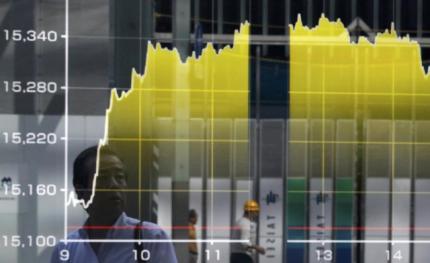Asian Shares Wobble In Early Trade, Euro Sinks
Bareksa • 01 Sep 2014

A pedestrian is reflected on an electronic board showing the graph of the recent fluctuations of Japan's Nikkei average outside a brokerage in Tokyo - (REUTERS/Yuya Shino)
Official China manufacturing data awaited.
Bareksa.com - Asian shares balked at the starting gate on Monday, skittish in the face of a deepening Ukraine crisis, while the euro touched a fresh one-year low ahead of this week's European Central Bank meeting.
Ukrainian President Petro Poroshenko warned a "full-scale war" was imminent if Russian troops continued to advance in support of pro-Moscow rebels as U.S. and European leaders threatened Moscow with further sanctions.
MSCI's broadest index of Asia-Pacific shares outside Japan was down about 0.2 percent in early trading, pulling away from Thursday's high of 515.13, its highest since early 2008.
Japan's Nikkei stock average added about 0.3 percent, after shedding 1.3 percent in August.
Later on Monday, a official survey of China's manufacturing sector due at 0100 GMT is expected to show factory activity weakened as demand faltered, though it will still indicate expansion rather than contraction, according to a Reuters poll.
On Wall Street on Friday, shares climbed ahead of Monday's U.S. Labor Day holiday.
The S&P 500 index set a new closing high, ending the day above the 2,000 milestone for the third time. For the month, the Dow Jones industrial average rose 3.2 percent, the S&P 500 added 3.8 percent, and the Nasdaq Composite gained 4.8 percent.
The dollar index was steady at 82.747 in Asian trade, touching Friday's 13-month of 82.773.
"Driven by the real and anticipated divergence in economic performance and trajectory of monetary policy, the long-anticipated U.S. dollar recovery has begun," Marc Chandler, global head of currency strategy at Brown Brothers Harriman in New York, said in a note to clients.
"As is evident in the positioning of the futures market, and confirmed by anecdotal evidence, speculative participants have amassed a significant large US dollar position," Chandler said.
Speculators raised their bullish bets on the U.S. dollar for a second week to their highest in more than two years, according to data from the Commodity Futures Trading Commission released on Friday. The dollar's net long position soared to $32.92 billion in the week ended Aug. 26.
The dollar rose about 0.1 percent to 104.19 yen, moving back toward last week's seven-month high of 104.49.
The euro, meanwhile, edged down to $1.3126 from around $1.3140 late in New York on Friday, reaching lows not seen since early September 2013, ahead of the European Central Bank meeting on Thursday.
Data on Friday showed inflation in the euro zone shrunk to a fresh five-year low of 0.3 percent in August, well below the ECB's "danger zone" of 1.0 percent.
Some analysts, including those at Nomura, are even betting that the ECB will cut all key interest rates by a further 10 basis points, setting a larger negative deposit rate of minus 0.20 percent.
A Reuters poll on Thursday before the euro zone inflation data put a 40-percent chance on the ECB conducting quantitative easing through the purchase of sovereign bonds by March next year.
The Bank of Japan will also meet this week, but is expected to hold monetary policy steady for now despite a spate of weak economic data last week.
Japanese household spending fell more than expected, the jobless rate inched up and factory output was weak in July, suggesting that April's sales tax hike could drag down the economy longer than expected.
But data released early on Monday showed Japanese companies raised spending on plant and equipment in the April-June period by 3.0 percent compared with the same quarter last year, showing a moderate recovery in business investment.
Britain, Canada and Australia will also hold monetary policy meetings this week, starting with the Reserve Bank of Australia (RBA) on Tuesday.
The RBA is widely expected to keep its cash rate steady at 2.5 percent for the 13th straight policy meeting. (Source : Reuters)